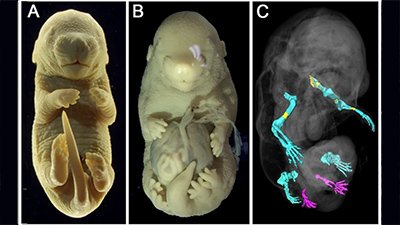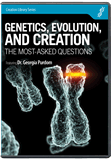Genetic Engineering: Are We Playing God?
A recent Pew Research poll asked several interesting and introspective questions about potential or real genetic engineering experiments on animals. The results were mostly what would be expected, with a few surprises along the way. But even more eye-opening were the questions that were not asked and the unspoken assumption behind the entire poll.
To begin with, it is clear that Americans neither indiscriminately accept nor reject genetic engineering experiments on animals. Depending on the purpose and the methodologies of such research, opinion can vary greatly. Research which would benefit human health and longevity the most were unsurprisingly the ones which received the most favorable responses.
The survey questions were worded with the responses being “appropriate use of technology” or “taking technology too far”. The actual questions and responses can be seen below. Questions which were left unanswered were not included in the percentages (which is why they do not total 100%).
Americans’ Views on Genetic Engineering of Animals Vary Widely by Its Intended Purpose
% of U.S. adults who say genetic engineering of each of the following is . . .

Note: Respondents who did not give an answer are not shown.
Source: Survey conducted April 23–May 6, 2018.
“Most Americans Accept Genetic Engineering of Animals That Benefits Human Health, but Many Oppose Other Uses”
Pew Research Center
Genetically modifying mosquitos to prevent such diseases as West Nile virus and modifying animals to be able to grow organs and tissues for transplant to humans garnered the (expectedly) most favorable results. Genetically modifying animals to increase protein and make their meat more nutritious was viewed more negatively but still received a large percentage of favorable responses.
Putting the Extinct Back into De-extinction
Perhaps the biggest surprise of this survey was that over 2/3 of people did not view using genetic engineering to bring back extinct animals as positive.
Perhaps the biggest surprise of this survey was that over 2/3 of people did not view using genetic engineering to bring back extinct animals as positive. It appears that Americans will pay top dollar to watch movies about such things (Jurassic Park and Jurassic World movies being the prime example) but have little desire to see taxpayer funds go toward such research. In fact, the recently revived (since 2015) Jurassic World franchise may be a major subconscious reason why this response is the way it is. Just the thought of out-of-control carnivorous dinosaurs running amok among humans today is the ultimate bogeyman. It is also the first thing that comes to mind if (and when) we think of genetic tinkering gone too far.
But as recently as 2013 (and you can still vote today) in an online in-article NBC poll people were asked about bringing back some decidedly less threatening (and non-carnivorous) animals like the woolly mammoth, passenger pigeon, and dodo, and only 20% polled were totally against it. The largest percentage 44% said the benefits outweighed the risks, while 36% seemed undecided, stating that the benefits and risks were equal. So, genetic engineering to enable the de-extinction of carnivorous dinosaurs with 6-inch teeth is a big “No thank you,” while the de-extinction of big furry elephants and not-so-bright birds is more of a “Why not?”
Glowing Profits, but Not Glowing Fish?
Back to the Pew survey, the least popular genetic engineering research was that which is done for cosmetic or frivolous purposes. The survey example was genetically altering aquarium fish to enable them to glow in the dark. Ironically this is one example of the genetic engineering of animals that is already being done, and, contrary to the Pew poll numbers, is exceedingly profitable. You can go to several sites to buy your neon fish and/or their accessories. So Americans may be wary of the genetics and the technology to make them, (or in actuality may just think them unnecessary) but will still readily buy them if available (sorry Californians).
“Science vs. Religion” or Caution vs. Recklessness?
But the Pew research team didn’t stop there. They also kept track of the pollster’s gender and grouped answers based on male and female responses. According to their numbers, men were more likely to approve all aspects of genetic engineering of animals more than women, in some cases by as much as 16 percent. They also had to do an obligatory “science vs. religiosity” survey which found that those with higher science knowledge and lower religiosity were more favorable to genetic engineering. Conversely a smaller share of those with medium (54%) or high (48%) religious commitment (compared to 68% with little religiosity) consider genetic engineering of animals to grow human organs or tissues for transplants to be appropriate. But perhaps these particular results merely show that women and more religious populations are less likely to embrace technology until it is conclusively demonstrated that there is no potential negative side effects or consequences (e.g. caution doesn’t necessarily equate to outright rejection).
The Reasons Given for Doubt
Fortunately, Pew didn’t stop there, but asked another probing question in order to find out why people thought as they did about the genetic modification of animals. If they answered “taking technology too far” in any of the first set of questions, they were asked to explain in their own words why they answered that way in a follow-up question.
The objections to genetically engineering mosquitos were (in order of vote percentage): “messing with nature/God’s plan”; ecosystem concerns; unintended consequences; or, other ways to achieve goals.1 For the animal organ donor/human transplant question, objection answers were in order: animal welfare; “messing with nature/God’s plan”; human health concerns; unintended consequences; or, other ways to achieve goals.2 Similar concerns showed up in the “genetic engineering for more nutritious meat” question with “unintended consequences” being the largest vote-getter.3 The objections to using genetic engineering to bring back extinct species showed that ecosystem concerns and “messing with nature/God’s plan” were the most frequent responses.4 While a “Jurassic Park” scenario was only directly mentioned in 4% of responses, that thought must be behind (at least on a subconscious level) some of the ecosystem and messing with nature/God’s plan responses. The “genetic engineering of aquarium fish” question was the least like the other questions with the largest number of responses being “not needed/waste of resources.”5
You Make the Call
Not including the aquarium fish question, most of the other four questions raised some interesting points about our usage of genetic engineering and why people are embracing, skeptical, cautious, or rejecting of such technology. Even for the question getting the most positive votes (genetically modifying mosquitos to prevent disease), the ones who expressed concern cited such things as upsetting the natural order, or the ecosystem. Indeed, some mosquitos act as plant pollinators, and even the bloodsucking ones with little direct benefit to man are the primary food source of creatures who do benefit mankind and/or benefit food crops.
For those who objected to the idea of using animals to grow organs or tissues for transplant in humans, concerns were raised about animal welfare (potential unchecked overexploitation) or about harm to humans (tissue/organ rejection, harmful side effects). Can anyone legitimately deny that these could be very real concerns? Similar concerns were raised with the “more nutritious meat” question. Unintended consequences, messing with God’s plan, and human health concerns are easily conceivable problems.
Even more down to earth, the “bringing back extinct animals” question showed that some people have thought of this topic by recalling recent examples of ecosystem damage due to introduced plants and animals. Introducing animals or plants in ecological niches where they are either completely new or had been absent for long periods has led to some devastating environmental issues. But there have also been examples of successful reintroduction of animals that had been extinct in particular regions and had positive impacts on the environment—wolves reintroduced to Yellowstone is one such example.
With any technology, there is potential for abuse, but genetic engineering also has the potential for benefit to mankind and animals.
But people who feel that genetic tinkering in these areas may be taking “technology too far” are hardly anti-science. They are being realistic in at least thinking ahead and foreseeing potential problems, consequences, or misuse of technology. Is it fair reporting to label this as a “science vs. religiosity” issue? In fact, it has often been demonstrated that those who take a cautious approach to medical technology ardently support it once all the bugs have been worked out. Indeed, this is the backbone methodology of organizations such as the FDA and the AMA—the very organizations which develop and implement much medical and pharmaceutical technology.
Conversely, had the questions been worded differently, or had there been explanations of safeguards or oversight of the technology built into the questions, the poll numbers would have likely been higher in favor of each question. For example, had the questions included statements about ethical treatment of research animals, increased testing and screening of organs before transplanting into humans, and a list of which animals were on the proposed list to bring back from extinction, many of those who questioned the technology may have chosen a different answer.
With any technology, there is potential for abuse, but genetic engineering also has the potential for benefit to mankind and animals in curing disease, increasing crop yields, and making organs more readily available for people. We’ve previously reported on adult stem cell therapies for patients with blindness or partial blindness due to corneal damage6 and for potential organoid and colon regrowth for patients with Crohn's disease or ulcerative colitis.7 This type of genetic engineering (of a person’s own adult stem cells) does not destroy an embryo and does not carry high risks of immune response and potential organ rejection.
The Unasked Question and the Unspoken Assumption
But the series of questions in this poll also glaringly show something that the pollsters probably never intended. There is an underlying assumption to this entire set of questions, which demonstrates an important biblical concept and is clearly seen once pointed out. Dr. David Menton just recently highlighted this point when he said, “If I told you that a medicine had just passed clinical trials on animals, would you think that it had been tested on humans? No of course not, we intuitively know that there is a fundamental difference between man and animals, especially when it comes to product testing or clinical trials.”8
In an evolutionary paradigm where humans are merely animals, why would you bother polling animals about other animals? Or if that is an accepted methodology, why not poll chimpanzees instead? After all, they have to deal with mosquito bites that lead to disease, and they also have problems with organ failure. Of course, that would have been a very short survey—all questions and no answers.
Mankind, made in the image of God (Genesis 1:27), is separated from animals implicitly in this survey.
In each of the questions asked about genetic engineering of animals, it is obvious that the poll is not asking about research conducted or proposed to be conducted on humans. Mankind, made in the image of God (Genesis 1:27), is separated from animals implicitly in this survey. Contrary to the Darwinian terminology instilled into people by the educational and scientific community, when it comes down to questions about ethics, morality and environmental stewardship, man is automatically considered separate from the animals in surveys like these. The Pew research team went to great lengths to determine levels of education, internet usage, amount of time spent in religious services and prayer, and the ability to answer basic scientific questions.9 The unspoken assumption being that the people responding to the survey were able to make categorical judgments and form opinions about research being or proposed to be performed on a non-human subject.
God never calls animals to forsake evil and come together and reason with him, but he does so to humanity (Isaiah 1:16–18). He never told animals that they had dominion over man, but instead said just the opposite (Genesis 1:26). Doesn’t this survey make that same assumption? Why appeal to what man thinks about animal research unless we have the power to perform or refrain from doing that research. When polling people about what one thinks of his place on this earth without inserting a conscious evolutionary bias, the polled intuitively views himself/herself as being separate and distinct from the animals.
If we are all just animals, and we carry that thought through every facet of life then this poll makes no sense. The very fact that the pollsters did this survey at all shows that they (and we) know deep down inside that there is a creator God and that we are separate from the animals (Romans 1:19–25). While this Pew survey on the surface was about genetic engineering of animals, in reality it was a lesson (unknowingly) extracted from Genesis 1. It is there and elsewhere in Scripture that we are told mankind is made in the image of God, has dominion over the animals, and is to be a wise and faithful steward (1 Corinthians 4:2) of the resources God gave him, including caring for and not overexploiting animals (Proverbs 12:10). While the Pew pollsters tried to inject a science vs. religion component into this poll, they ironically showed that true science and Scripture agree perfectly.
Footnotes
- Pew Research Center, “Objections to genetically engineering mosquitoes to prevent disease include potential harm to ecosystem,” August 13, 2018, http://www.pewinternet.org/2018/08/16/most-americans-accept-genetic-engineering-of-animals-that-benefits-human-health-but-many-oppose-other-uses/ps_2018-08-16_biotech-animals_0-04/.
- Pew Research Center, “Objections to genetic engineering for human organ transplant include concern for animals, risk to humans,” August 13, 2018, http://www.pewinternet.org/2018/08/16/most-americans-accept-genetic-engineering-of-animals-that-benefits-human-health-but-many-oppose-other-uses/ps_2018-08-16_biotech-animals_0-05/.
- Pew Research Center, “Objections to genetic engineering for more nutritious meat include risk to human health and animal welfare,” August 13, 2018, http://www.pewinternet.org/2018/08/16/most-americans-accept-genetic-engineering-of-animals-that-benefits-human-health-but-many-oppose-other-uses/ps_2018-08-16_biotech-animals_0-06/.
- Pew Research Center, “Objections to genetic engineering to bring back extinct species include risk to ecosystem,” August 13, 2018, http://www.pewinternet.org/2018/08/16/most-americans-accept-genetic-engineering-of-animals-that-benefits-human-health-but-many-oppose-other-uses/ps_2018-08-16_biotech-animals_0-07/.
- Pew Research Center, “Objections to genetic engineering of aquarium fish raise questions about need, benefit,” August 13, 2018, http://www.pewinternet.org/2018/08/16/most-americans-accept-genetic-engineering-of-animals-that-benefits-human-health-but-many-oppose-other-uses/ps_2018-08-16_biotech-animals_0-08/.
- Answers in Genesis, “Adult Stem Cells in Blindness-Curing Treatment,” June 26, 2010, https://answersingenesis.org/sanctity-of-life/stem-cells/adult-stem-cells-blindness-curing-treatment/.
- Troy Lacey and Avery Foley, “Colon Grown with Adult Stem Cells,” August 2, 2017, https://answersingenesis.org/sanctity-of-life/stem-cells/colon-grown-adult-stem-cells/.
- Dr. David Menton, quoted from a meeting on August 16, 2018.
- Cary Funk, Meg Hefferon, “Methodology,” August 26, 2018, http://www.pewinternet.org/2018/08/16/animal-biotechnology-methodology/.
Recommended Resources

Answers in Genesis is an apologetics ministry, dedicated to helping Christians defend their faith and proclaim the good news of Jesus Christ.
- Customer Service 800.778.3390
- © 2024 Answers in Genesis






